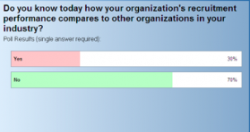 It blows my mind how the subject and function of competitive intelligence falls by the wayside in most HR/recruiting departments. Just what exactly is competitive intelligence and what is it used for? Let’s start first by defining it:
It blows my mind how the subject and function of competitive intelligence falls by the wayside in most HR/recruiting departments. Just what exactly is competitive intelligence and what is it used for? Let’s start first by defining it:
Definition: the action of defining, gathering, analyzing, and distributing intelligence about products, customers, competitors and any aspect of the environment needed to support executives and managers in making strategic decisions for an organization (Wikipedia.org)
A couple weeks back, I participated in a webinar about strategic recruiting methods along with over 400 HR/recruiting professionals. During the call, the host took a live quickpoll on the topic of competitive intelligence; here is the question that was posed to the participants, “Do you know today how your organization’s recruitment performance compares to other organizations in your industry?”
After a quick minute of tallying the results, an overwhelming 70% of the participants did not know how their own organizational recruitment performance stacked up against their competition, which leads me to ask: why not?
When I contemplate the concept of competitive intelligence and how it can impact a company’s recruitment strategy and performance, I cannot see how more companies are not incorporating this subject into a core strength of their recruitment strategy. I began to think further into some other industries/professions that I have strong interest in, where competitive intelligence is the starting point for strategies and plans.
Professional football is the industry at the top of my mind when it comes to competitive intelligence. NFL teams step on the field every Sunday during the regular season with real-time intelligence of the opposing team’s playbook, tendencies, tricks, coaches, and players. They want to know ahead of time what the opposing team may do: what play will they run, and what personnel package they will have on the field, for example. They want to gain the advantage on the competing team. NFL teams typically spend the equivalent of a few days watching film, studying pictures, and reviewing playbooks and players before the first game whistle is blown. Former head coach Jon Gruden went as far to make it a point to know what types of shoes the opposing players were going to wear.
Companies that sell products use competitive intelligence on a massive scale and on a daily basis. A perfect example is the competitive intelligence war in the soda industry. Coke & Pepsi are two industry leaders that use demographics, psychographics, consumer data, research, and numerous other data sources to locate their ideal consumers and then target consumers in various methods. So why is competitive intelligence not a larger part of the recruitment functions of companies? Why did 70% of HR/recruiting professionals on the webinar have no idea what their competitors are doing?
There are numerous tools and resources available to help companies and organizations gain competitive intelligence when it comes to the recruiting function. For example, there are reports available that provide real-time business intelligence for the marketplace. If you don’t know where to look or how to get your hands on these reports, there are agencies out there that specialize in such technology and can help you. Cutting edge HR/recruiting departments use such reports and intelligence to analyze employment trends, gather competitive intelligence, forecast economic conditions, and source hard-to-fill positions.
The same principles of competitive intelligence can be use within the recruitment functions and activities of companies. Using competitive intelligence can provide a dashboard of the competitions strategy. Give your organization a recruiting advantage. Use competitive intelligence to gain a step up on the competition and beat your competitor to the talent you desire. Don’t be one of the 70%’ers that are lost in the sauce.